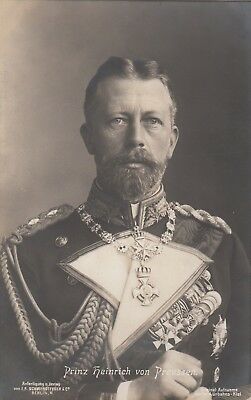Henry I, German Emperor
| Henry I | |
|---|---|
 | |
| German Emperor King of Prussia | |
| Reign | 15 June 1888 - 20 April 1929 |
| Predecessor | Frederick III |
| Chancellors | |
| Born | Prince Henry of Prussia 14 August 1862 Berlin, Kingdom of Prussia |
| Died | 20 April 1929 (aged 66) Berlin Palace, Berlin, German Empire |
| Burial | |
| Spouse | Princess Irene of Hesse and by Rhine (m. 1888) |
| Issue | |
| House | Hohenzollern |
| Father | Frederick III, German Emperor |
| Mother | Victoria, Princess Royal |
| Religion | Lutheranism |
Henry I (Albert William Henry; 14 August 1862 - 20 April 1929), or Heinrich I was German Emperor and King of Prussia from 1888 to 1929. Born as the second eldest son of Frederick III, German Emperor, Henry initially grew up as an average Prussian prince when in 1867, following the unexpected passing of his older brother, Prince Wilhelm, who was next in line to the throne after their father, Crown Prince Frederick, at an early age due to injuries sustained from his riding lessons, a five-year-old Henry, as his father's oldest living descendant (women were prohibited from inheriting the throne), was soon thrust into the spotlight as the future ruler of what later became the German Empire.
Prior to his ascension to the throne, Henry grew up to become a mostly successful and accomplished career naval officer in the Imperial German Navy, eventually reaching the rank of Großadmiral prior to his ascension to the throne. Eventually, in 1888, after roughly 99 days on the throne, the brief reign of his father, Frederick III came to an end, resulting in the subsequent accession of Henry to the throne. For the first few years of his reign, Henry considerably struggled with the powerful influence of the powerful Chancellor Otto von Bismarck. However, Bismarck's retirement in 1895 due to old age finally allowed Henry to chart his own course for the nation in a more unrestricted manner, as he mostly went on to appoint moderate or liberal-leaning candidates in Bismarck's former spot as chancellor, most of whom supported Henry's policy of maintaining the status quo established by Bismarck. In 1914, despite Germany's alliance with her ally, Austria-Hungary in the form of the Triple Alliance, Henry notably declared his country's exclusion from the conflict, thereby leaving Austria-Hungary alone against the Triple Entente, to whom they ultimately surrendered after two years of war, resulting in their subsequent dismemberment and partition, thereby leaving the German Empire the sole power in Central Europe.
Later on, in his final years as German Emperor, Henry presided over a continuous and uninterrupted growth of the German economy, although, just a few months after his death, the Great Depression crisis came into motion, and which would go on to affect most major economies of the world, including Germany's.